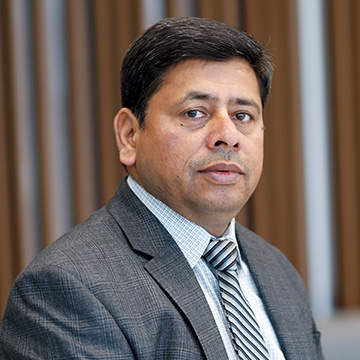
Dr. Gajendra S. Shekhawat
SPID Manager / Research Professor
Office: Technological Institute AG94 & Silverman Hall #1529
Tel: 847-491-3204
Email: g-shekhawat@northwestern.edu
Personal Statement
Gajendra S. Shekhawat is a Research Professor of materials science & engineering, and Manager of the Scanned Probe Imaging and Development Center (SPID). He is leading and contributing to groundbreaking research initiatives at the intersection of physical and life sciences. My journey has been defined by a relentless pursuit of innovation and a commitment to bridging disciplines to advance scientific knowledge. At the heart of my academic and research endeavors lies the Scanned Probe Imaging and Development Center (SPID), a dynamic hub where cutting-edge atomic and nanoscale microscopy, characterization, and instrumentation capabilities converge. SPID serves as a testament to our commitment to pushing the boundaries of what is possible in the realm of scanning probe microscopy. With over three decades of experience in micro-mechanical devices, CMOS fabrication, scanning probe microscopy, and instrumentation, Dr. Shekhawat has witnessed the evolution of these fields and actively contributed to their growth. His passion for innovation has driven him to develop new facilities for non-invasive biological imaging, shedding light on the intricate structures of both biological and physical entities.
Additionally, he has led pioneering efforts in the integration of cantilever-based sensing technologies, enabling rapid detection of viral pathogens and pulmonary diseases—a testament to the real-world impact of our research. Recognition from professional societies and the receipt of numerous awards are affirmations of our interdisciplinary approach. By seamlessly merging advanced physical science capabilities with the realm of bio-nanomedicine, he has made significant strides in the field of microscopy and sensors. This recognition inspires him to continue pushing boundaries and seeking novel solutions to complex scientific challenges. Beyond the confines of his institution, he played a pivotal role in fostering international collaborations, particularly with Switzerland, India, and Singapore. These partnerships have enriched our research endeavors and expanded our global footprint in scientific exploration.
Research Objectives and Approach
Interdisciplinary Research in Nanoelectronics, Biomedicine, and Materials Science
During his tenure at Northwestern University, Dr. Shekhawat has cultivated a comprehensive research portfolio at the intersection of nanoelectronics, biomedicine, and materials science. The work encompasses a diverse range of projects and collaborative efforts. Key areas of expertise include:
- NEMS-Based Diagnostics: He has pioneered the development of point-of-care diagnostic platforms that leverage nanoelectromechanical systems (NEMS) for multiplexed detection of critical biomarkers, such as HIV p-24 antigen, HCV Core Antigen, and HBV Surface Antigen. These advancements hold significant promise for rapid and accurate disease diagnosis.
- Water Quality Monitoring: The research has yielded innovative sensors capable of rapid and highly sensitive detection of water contaminants. By integrating nanomechanical cantilever systems with fluidic assemblies, you've successfully identified contaminants like Tetracycline, Cadmium (Cd), and lead (Pb), with applications for real-time monitoring in diverse water sources.
- Infectious Disease Detection: Substantial contributions to the fight against infectious diseases. The research on NEMS-based sensors and synthetic biology-enabled minibinders has enabled the rapid and sensitive detection of pathogens, including SARS-CoV-2. Collaborations with esteemed institutions and researchers have validated the effectiveness of these diagnostic tools.
- Materials Characterization with Scanning Ultrasound Holography: Collaborating with Toyota Motor Corporation, I am pioneering the use of scanning near-field ultrasound holography to assess sub-surface defects and structural integrity in automotive materials. This effort represents a promising venture into the automotive industry.
- Biomechanics of Biological Tissues: The investigations into the biomechanics of ovarian and mouse brain tissues, conducted in collaboration with medical professionals, have revealed insights into tissue stiffness and the role of hyaluronan (HA).
- Nanomechanics of Endothelial Cells: Collaborative work with Steven Dudek, Chief, Pulmonary division at UIC has led to breakthroughs in quantifying nanomechanical properties of endothelial cells. This research is vital for developing therapies for acute lung injuries and understanding complex biological structures.
- Hybrid Organic-Inorganic Perovskites (HOIPs): The systematic exploration of the fracture mechanical properties of HOIPs has contributed to the understanding of their structure-fracture-mechanical property relationships. This knowledge is invaluable for designing mechanically durable photovoltaic modules and flexible electronics based on HOIPs.
Educational & Research Background
I am a dedicated and accomplished researcher in the field of medical diagnostics and instrumentation at Northwestern University. With a strong passion for scientific inquiry and a commitment to advancing knowledge in MEMS-based sensors, scanning probe microscopy-based instrumentation, I have made significant contributions to both academia and industry.
Research Interests:
- Micromechanical Devices and System
- CMOS-based diagnostics sensors.
- Scanning Probe Microscopy and associate instrumentation
- Molecular devices and sensors
- Material characterization and synthesis
I completed my Ph.D. in Physics and Engineering from Rajasthan University and Central Electronics Engineering Research Institute back in India in 1996. During my doctoral studies, I conducted groundbreaking research on superconducting materials and devices and scanning probe microscopy of surfaces as well as interfaces on a wide range of materials. I have over 100 publications in peer-reviewed journals such as Nature, Science, Nature Nanotechnology, and others.
